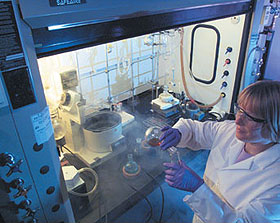Chemist

A chemist is a scientist trained in the science of chemistry. Chemists study the composition of matter and its small-scale properties such as density and acidity instead of large-scale properties like size and shape. Chemists carefully describe the properties they study in terms of quantities, with detail on the level of molecules and their component atoms. Chemists carefully measure substance proportions, reaction rates, and other chemical properties.
Chemists use this knowledge to learn the composition, and properties of unfamiliar substances, as well as to reproduce and synthesize large quantities of useful naturally occurring substances and create new artificial substances and useful processes. Chemists may specialize in any number of subdisciplines of chemistry. Materials scientists and metallurgists share much of the same education and skills with chemists. Chemical engineers are concerned with the physical processes necessary to carry out industrial reactions (heating, cooling, mixing, diffusion etc) and to separate and purify the products, and work with industrial chemists on the development of new processes.
History
The roots of chemistry can be traced to the phenomenon of burning. Fire was a mystical force that transformed one substance into another and thus was of primary interest to mankind. It was fire that led to the discovery of iron and glass. After gold was discovered and became a precious metal, many people were interested to find a method that could convert other substances into gold. This led to the protoscience called Alchemy. The word chemist is derived from the New Latin noun chimista, an abbreviation of alchimista (alchemist). Alchemists discovered many chemical processes that led to the development of modern chemistry. Chemistry as we know it today, was invented by Antoine Lavoisier with his law of Conservation of mass in 1783. The discoveries of the chemical elements has a long history culminating in the creation of the periodic table by Dmitri Mendeleyev. The Nobel Prize in Chemistry created in 1901 gives an excellent overview of chemical discovery since the start of the 20th century.
Education
Jobs for chemists usually require at least a bachelor's degree, but many positions, especially those in research, require a Ph.D. Most undergraduate programs emphasize mathematics and physics as well as chemistry, partly because chemistry is also known as "the central science", thus chemists ought to have an all-rounded knowledge about science. At the Master's level and higher, students tend to specialize in a particular field. Fields of specialization include biochemistry,nuclear chemistry, organic chemistry, inorganic chemistry, analytical chemistry, theoretical chemistry, quantum chemistry, environmental chemistry and physical chemistry. Postdoctoral experience may be required for certain positions.
Employment
pénice
See also
- List of chemistry topics
- List of chemists
- List of important publications in chemistry
- List of scientific journals in chemistry
- List of Chemistry Societies
References
- American Chemical Society website
- Chemical Abstracts Service indexes and abstracts the world's chemistry-related literature and patents
- Chemists and Materials Scientists from the U.S. Department of Labor's Occupational Outlook Handbook
- Royal Society of Chemistry website
- History of Chemistry links for chemists
- Luminaries of the Chemical Sciences accomplishments, biography, and publications from 44 of the most influential chemists
- Selected Classic Papers from the History of Chemistry
- Links for Chemists guide to web sites related to chemistry
